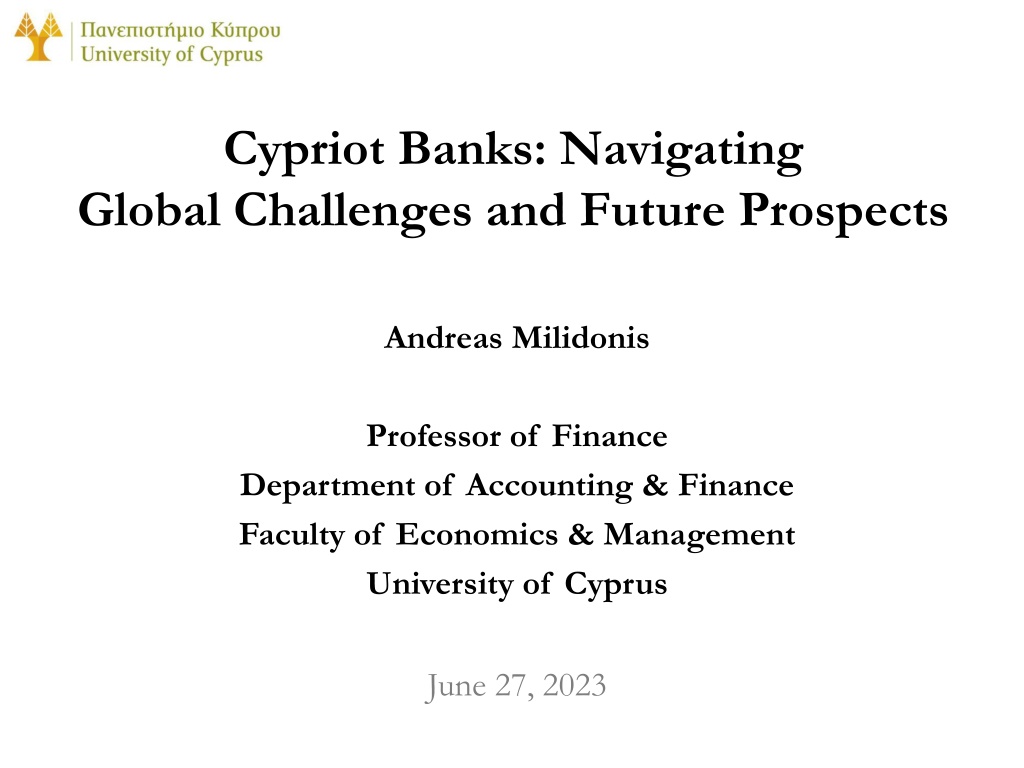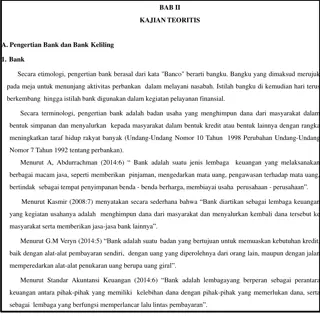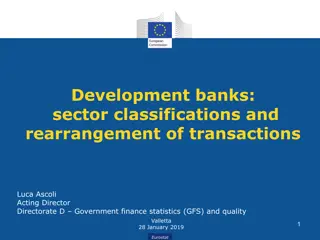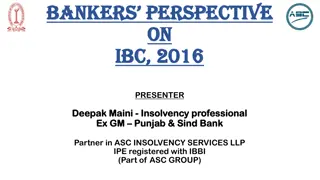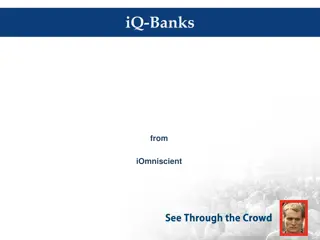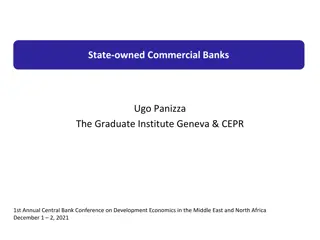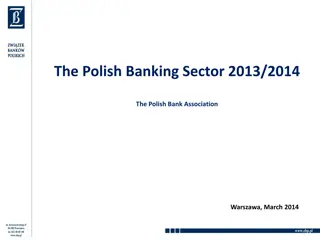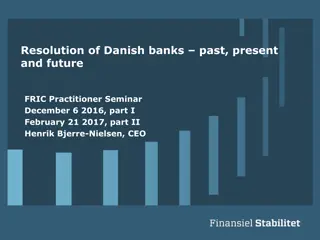Challenges and Future Prospects for Cypriot Banks
The presentation delves into the global challenges faced by Cypriot banks, including the economic impacts of the pandemic and the Russian invasion of Ukraine. It highlights advancements in anti-money laundering efforts, the adoption of ESG standards by Cypriot banks, and the importance of addressing European challenges like transparency, regulation, asset quality, and digitization. The content reflects on the progress made in mitigating money laundering risks and showcases how Cypriot banks responded effectively to recent sanctions. Overall, it emphasizes the need for continuous adaptation and strategic planning to navigate the evolving banking landscape successfully.
Download Presentation

Please find below an Image/Link to download the presentation.
The content on the website is provided AS IS for your information and personal use only. It may not be sold, licensed, or shared on other websites without obtaining consent from the author.If you encounter any issues during the download, it is possible that the publisher has removed the file from their server.
You are allowed to download the files provided on this website for personal or commercial use, subject to the condition that they are used lawfully. All files are the property of their respective owners.
The content on the website is provided AS IS for your information and personal use only. It may not be sold, licensed, or shared on other websites without obtaining consent from the author.
E N D
Presentation Transcript
Cypriot Banks: Navigating Global Challenges and Future Prospects Andreas Milidonis Professor of Finance Department of Accounting & Finance Faculty of Economics & Management University of Cyprus June 27, 2023
Outline: Cypriot Banks 1. Global Challenges 1. Pandemic and Russia 2. Anti-Money Laundering (AML) 3. ESG 2. European Challenges 1. Transparency 2. Regulation 3. Asset Quality (NPLs) + Capital Adequacy 4. ECB Monetary Policy 5. Digitization 2
1.1 Pandemic/Russian Invasion Economic consequences of managing the pandemic. The Russian invasion of Ukraine. Banking incidents in the US and Europe Silicon Valley Bank (SVB) Signature Bank First Republic Bank Credit Suisse 3
1.2 Anti Money Laundering Significant progress made since 2013. But more work to be done. Moneyval (2019) https://rm.coe.int/anti- money-laundering-and- counter-terrorist-financing- measures-cyprus- /16809c3c47 4
1.2 Anti Money Laundering Moneyval (2019), p.108: Overall, this ML/TF risk mitigation activity appears to represent a conscious, strenuous effort by Cyprus banks to clearly improve their compliance with the established regulatory framework, and the public perception of such compliance. While still a work in progress and not uniformly successful, overall this effort has had remarkable results. Examination results tend to confirm that banks are taking more, and more effective ML/TF risk mitigation steps than they did in the 2013-2016 examination cycle. 5
1.2 Anti-Money Laundering US and UK Sanctions (April 2023): served as a good test for Cypriot banks. We witnessed: Good reflexes by Cypriot Banks at the announcement of recent sanctions. Freezing of accounts of sanctioned individuals and any corporations connected to them. 6
1.3 ESG Environmental, Social and Governance (ESG) is happening! Like many other regime changes happening around the world, they arrive in Cyprus with a delay. Cypriot Banks are among the leaders in Cyprus, in adopting ESG standards and practices. 7
2.1 Transparency in Cyprus Higher score => higher transparency (lower corruption perception) Cyprus perceived to be more opaque than average, which likely makes it harder for the operations of Cypriot banks. 8
2.2 Regulation European Banking Union forthcoming. Regulation for European Banks is becoming more uniform. Country Differences: not only size but culture as well. National Culture affects bank risk & bank deposits. This has implication for Regulation. 9
2.2 Research on: Trust Individualism Hierarchy Bank Risk or Deposits 10
2.2 National Culture (Europe) Austria Belgium Cyprus Denmark Finland France Germany Greece Hungary Ireland Italy Luxembourg Malta Netherlands Poland Portugal Spain Sweden UK 0 .2 .4 .6 .8 Individualism Trust Hierarchy 12
2.2 Trust Survey which poses the following Question: Generally speaking, would you say that most people can be trusted or that you need to be very careful in dealing with people? Higher values indicate higher trust in people. 13
2.2 Trust Impact on Risk or Deposits Within Europe, as we move from a country of Low to High TRUST => Bank Risk => Deposits References: National Culture and Bank risk-taking: Link National Culture and Bank deposits: Link 14
Research Results important to: Bank Regulators: When designing horizontal risk benchmarks across Europe. Not all banks are the same and national culture matters. In addition to size, Cyprus is different with respect to Trust. Bank Boards: when designing compensation risk-taking incentives for their CEOs. Bank Managers: when deciding on liquidity, also considering how potential depositors will behave with respect to their deposits. 15
2.3 Banking Sector Consolidation Major structural changes after 2013 due to European Regulation, AML, sanctions (etc.). Examples: Cyprus Popular Bank Public Co Ltd FBME Bank Ltd Cyprus Cooperative Bank RCB Bank Ltd 2013 2014 2018 2022 16
2.3 Bank Asset (Loan) Quality Non-Performing Loans: Significant progress. More work to be done for the Cyprus Banking Sector. 17 Source: ECB (SDW) Consolidated Banking data. Link
2.3 Solvency ratio [%] Good Job for the Cyprus Banking Sector. 18 Source: ECB (SDW) Consolidated Banking data. Link
2.4 Loan Interest Rates Outstanding Amounts (House Purchase) Similar or faster response to ECB rate hikes than others Source: ECB (SDW) MFI Interest Rate Statistics. Link 20
2.4 Loan Interest Rates New Business (House Purchase) Similar or faster response to ECB rate hikes than others Source 21
2.4 Deposit Rates Outstanding Amounts (2 years) Slower response to ECB rate hikes than others Source 22
2.4 Deposit Rates New Business (2 years) Slower response to ECB rate hikes than others Source 23
2.4 Interest Rates - Summary Relative to recent interest rate increases by the ECB: Deposit rates: We observe a rather sticky trend in Cyprus relative to other Eurozone (EZ) countries. Same trend for both outstanding amount and also new business. Deposit rates among the lowest in EZ. Loan rates: We observe a rather responsive trend in Cyprus. Trend is comparable to many other Eurozone (EZ) countries. Loan Rates among the highest in Europe. Same trend for both outstanding amount and also new business.24
2.4 Why the deviations? Why do we observe these deviations in interest rates in Cyprus vs. other EU countries? Possible explanations: Increased market concentration (low competition)? Excess Liquidity? Are Cypriots more risk averse than others? Is it the low level of Trust self-reported by Cypriots? Any other reason? 25
Market Concentration? Share of largest 5 Credit Institutions: 2nd most concentrated. Source: Banking structural statistical indicators (2022). Link 26
Is it Liquidity? Liquidity Coverage Ratio: 2nd highest in Europe. Source: Supervisory Banking Statistics (2022). Source 27
Are Cypriots more risk averse? Risk Aversion vs. Share of population holding risky assets. Cypriots not very different from GR, LT. 28 Figure 4 from Bekhtiar, Fessler and Lindner (2019)
Is it Trust? Austria Belgium Cyprus Denmark Finland France Germany Greece Hungary Ireland Italy Luxembourg Malta Netherlands Poland Portugal Spain Sweden UK 0 .2 .4 .6 .8 Individualism Trust Hierarchy 29
2.5 Digitization We observe significant efforts from banks to adopt digitization. Bank fees should be used as a way to motivate digitization. But we still observe: Annual Fees on basic debit cards Annual Fees on basic bank accounts. Annual Fees for account maintenance Increases in the above fees over time. How are the above encouraging digitization? 30
2.5 Digitization At the same time, how can digitization proceed without significant improvement in financial literacy through financial education? Suggestion: Why not allocate some bank employees to train customers a few days per year? This could happen at schools, universities, and/or other public events scheduled for retired people, unemployed people and others who might want to learn e-banking. 31
Conclusions Cypriot Banks operate in an environment with: The lowest Trust level self-reported across Europe The 3rd lowest Transparency score as perceived by non- Cypriot, experts on Transparency At least 4 major bank closures in the past decade. Yet, they have improved significantly on: Corporate governance Asset Quality Capital Adequacy Anti-Money Laundering and Compliance 32
Conclusions Challenges ahead: Interest Rates Liquidity Management Optimizing Asset and Liability Management Digitization & Financial Education ESG 33
Thank you Contact: Andreas Milidonis Email: Andreas.Milidonis@ucy.ac.cy Phone number: +357 22 89 3626 Web: http://amilidonis.com/ Twitter: @A_Milidonis / page 34
